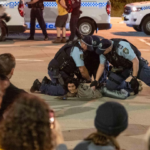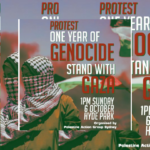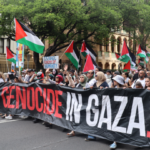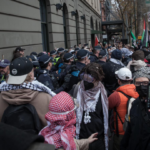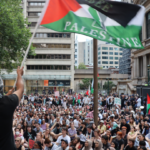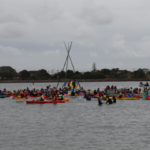Wollongong Friends of Palestine’s Jet Hunt on the Ongoing Bisalloy Steel Community Picket
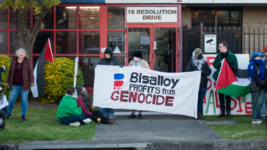
According to Wollongong Friends of Palestine organiser Jet Hunt, a “strong appetite for mass militancy” has taken hold across grassroots Australia, ever since Israeli forces unleashed a genocidal assault upon the Palestinians of the walled-in Gaza Strip fourteen months ago, with this attack increasingly spilling out into the West Bank with growing intensity over the same period.
Hunt’s been a participant in the ongoing Wollongong Friends of Palestine community picket outside Bisalloy Steel’s Unanderra factory premises over the months of the Gaza genocide, as it calls on the steel manufacturer to stop supplying the Israeli state with armoured steel to make tanks and militia vehicles that have been used in the Palestinian territory, and increasingly so, on Lebanese soil.
The community pickets have included local Palestinians from the Illawarra region, who have extended family members in Gaza, as they call out “Australia’s only manufacturer of high-tensile and abrasion-resistant quenched and tempered steel plate” on its direct contribution to the mass murder, displacement and imprisonment of Palestinian people.
On 15 November 2024, the fourth Wollongong Friends of Palestine community picket out the front of Bisalloy Steel Unanderra comprised of unionists, students and grassroots activists, and with supporters arriving from across the state of NSW, the latest direct action targeting the steel factory was noted by increasing numbers and a more formidable impact that covered the entire day.
Resistance building
Those picketing for Palestine in the Wollongong region explain that this sort of direct action taken in regard to private economic interests in support of Israel has been growing since the start of the genocide in Gaza, and the ongoing campaign against Bisalloy Steel in Unanderra reflects how these types of mobilisations have been shaping up over the last fourteen months of the catastrophe.
The third Bisalloy Steel picket was held in September and it was the first such demonstration that resulted in a full day shutdown of the factory. Bisalloy Steel’s annual general meeting was further rescheduled to be held online on 8 November, after protesters had announced their intentions to rally against the event. And the 15 November picket successfully saw another full day shutdown.
Wollongong Friends of Palestine member Yakov said ahead of the November picket that the ongoing demonstration was “one of the most important things we can do in Australia”, as while “Penny Wong’s expressions of concern do not save lives”, “what does… is disrupting Bisalloy’s business. If they are not able to get out a shipment on time… that means one less tank in the Gaza Strip”.
A history of resistance
The 15th November Bisalloy community picket was further notable as it took place on the 86th anniversary of the Dalfram Dispute, which involved the Waterside Workers’ Federation refusing to load the steamship Dalfram in Port Kembla in 1938 with pig iron, as it was bound for Japan at a time, when that nation occupied China’s Manchuria region and was engaging in the mass killing of locals.
Sydney Criminal Lawyers spoke to Wollongong Friends of Palestine organiser Jet Hunt about the momentum that is building across the country for community picket-style demonstrations that target private businesses, the implications of this shift in terms of a rising willingness to be more militant on the part of local protesters, as well as the impact that her group’s actions are having in Wollongong.
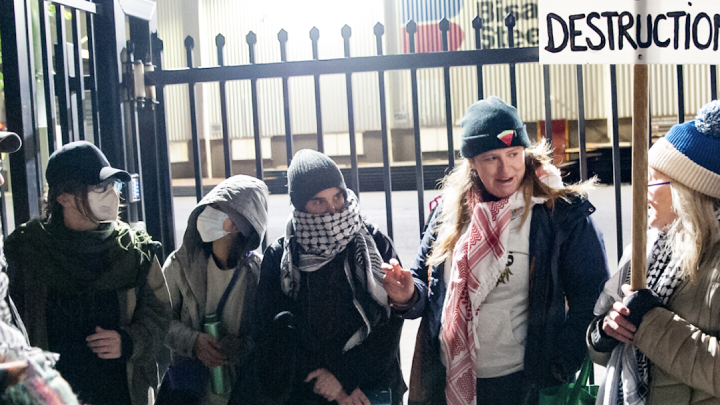
Wollongong Friends of Palestine (WFOP) established its fourth protest picket blocking the entrance to the Bisalloy Steel factory in Unanderra on 15 November.
This action in opposition to the genocide in the Gaza Strip and Bisalloy’s contribution to it has been ongoing for some time.
So, Jet, can you tell us about why you’re targeting Bisalloy, and what has the ongoing action comprised of so far?
Wollongong Friends of Palestine is targeting Bisalloy Steel because they supply armoured steel to both the Israeli Occupation Forces and illegal settlements in the West Bank and in 1948 Palestine.
It’s clear that armoured steel is arming a genocide. As a personal example a comrade I have long admired, Ammo Ziad, was attacked in his home by the IOF.
Armoured trucks and tanks encircled his home, and ambulances couldn’t get through. He bled out in his courtyard.
Bisalloy claim their products “protect people and property”, but what they are really protecting is the IOF and the settler state’s ability to kill with absolute impunity.
For most of us, it was just unconscionable that this armoured steel was being manufactured in our own backyard.
There have been actions against Bisalloy since they bragged about being added to Rafael’s supply chain in 2018.
In 2023 and 2024, given the genocide we are all witnessing, this coalesced into a campaign to get Bisalloy to fully divest from the war machine.
They are also contracted to AUKUS submarine manufacturing.
As a community we are broadly antiwar and don’t want anyone anywhere to face imperialist violence.
Our campaign against Bisalloy’s war machine so far has embraced a diversity of tactics. They have included an office occupation in December, a lock-on in March, and four community pickets.
This has been happening in the context of weekly rallies and actions outside of local MPs offices.
The shift to community pickets has been really politically important for us, tactically speaking.
It’s a shift towards mass militancy. We are no longer asking governments to make changes – nicely or otherwise – we are taking the power into our own hands and materially forcing companies to cut ties with Israel by physically stopping work.
But we’ve done this in a way that involves the participation of lots of people working together. We’re no longer asking for things: we are making them happen ourselves.
There’s also something important about the character of what we are doing, as Wollongong Friends of Palestine call the picket and collectively organise it.
We do this through open meetings that anyone can attend and contribute to.
Then, on the day of the picket, all decisions are made collectively, though they’re not binding – people contribute tactically and materially in whatever ways make sense to them, with the shared goal of picketing Bisalloy at the centre.
The process of what we’re doing and how we do it is, in many ways, just as important as what we actually end up doing.
The Bisalloy campaign has recently announced that it has discovered some high-profile figures involved in the steel company.
So, can you outline what you have learnt about the company’s well-known investors?
We know that Malcom Turnbull has a significant stake in Bisalloy, with over a million dollars’ worth of shares in the company.
Turnbull actually visited Bisalloy and did a tour of the facility. This was after their announcement of being added to the Rafael supply chain.
It’s also clear that Bisalloy majority shareholders have various stakes in political Zionism.
Peter Smaller, the second largest shareholder, was the president of the Jewish National Fund for five years.
Bisalloy board chairman and majority shareholder David Balkin served as the president of the Jewish Communal Appeal and has ongoing links there.
It’s good to note that the shareholders are making political decisions by being committed to maintaining links with Israel.
They don’t care about their workers, they don’t care about the community, and they certainly don’t care about international law – they care about their own interests.
They’re happy to expose their own workers to risk of prosecution in order to turn a profit and maintain Zionism.
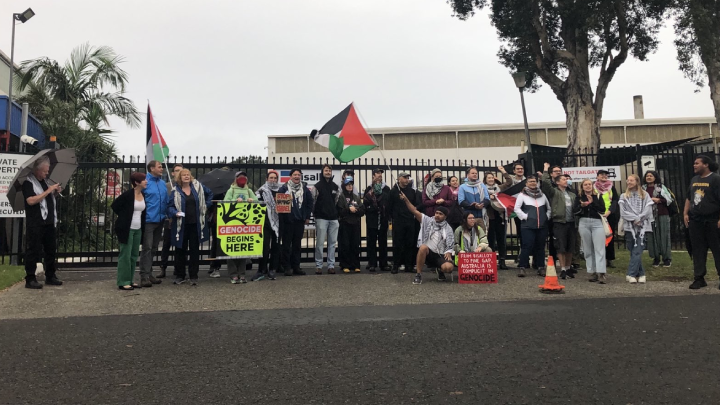
Despite the government’s ongoing denial of any two-way arms trade with Israel over the 14 months of the Gaza genocide, it came to light in Senate estimates in October that this nation continued to have 66 active export permits with Israel.
However, in response to a question on notice, Defence deputy secretary Hugh Jeffrey outlined in Senate estimates this month that 16 of these export permits had lapsed or have been ended due to the “very high number of civilian deaths” that Israel is perpetrating.
What do you think about this admission over a year into the Gaza genocide?
I’m certainly not surprised that we have a relatively high number of export permits.
The fact that only sixteen have ended is the shocking part – and it’s worth noting that the absolute lack of transparency around decision-making for defence exports means we are unlikely to know if those lapsed permits are reapplied for in the near future.
Under capitalism companies will profit off genocide. The occupation of Palestine has been highly lucrative for surveillance firms, munitions companies and steel manufacturers.
Because of this, lots of companies have been manoeuvring around export controls for decades, producing products that have various levels to plausible deniability or multiple uses.
The popularity of actions like the community picket at Bisalloy – but also the port blockades, and even Rising Tide – see people’s interest in taking direct action and it indicates that there is little trust in processes, like defence export controls, to actually protect people in Gaza and Palestine, or to represent community.
There’s a real sense that decisions about supplying war machines shouldn’t be made by governments. They need to be made by the people.
Over the last 14 months, there has been a notable move on the part of those mobilising against the Gaza genocide towards these direct actions targeting companies that are financially benefiting from Israel’s large scale mass killings.
These community pickets have been ongoing and acted as something of an accompaniment to regular street protests. What’s your assessment of this shift?
The shift to community pickets has been politically important for us, tactically speaking.
It’s a shift towards mass militancy. We are no longer asking governments to make changes, nicely or otherwise.
We are taking the power into our own hands and materially forcing companies to cut ties with Israel by physically stopping work.
We’re no longer asking for things: we are making them happen ourselves.
But we’ve done this in a way that involves the participation of lots of people working together.
We encourage people to engage in tactics that make sense for them, to work in groups with comrades they trust, and we set up a zone for kids and families.
We’ve had circus workshops, Food Not Bombs and a composting toilet.
Our hope is to develop something that’s militant in character, but that everyone can be a part of.
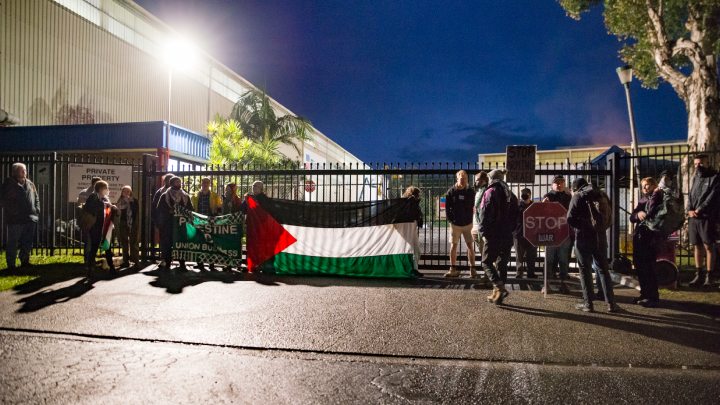
In finding that the Israeli occupation in the Palestinian territory breaches international law in July, the International Court of Justice further determined that arming Israel is also an illegal act.
How do you consider the Australian government’s support for Israel has been since July, in light of this finding? And what should this country be doing in order to honour the ruling?
The only way to honour the ruling fully would be to sever all ties with Israel. There are too many exports with multiple uses – too many.
And lastly, Jet, how has the Wollongong Friends of Palestine campaign against Bisalloy been impacting? And what’s the response been like?
Our first two community pickets delayed work, with only a skeleton shift able to work for most of the morning.
Our second two pickets secured full twelve-hour shutdowns of production.
It’s a huge win – not just that our pickets have been effective, but that their efficacy has actually increased over time.
This has been due to WFOP becoming palpably more militant and more organised over time. And I’m very proud and excited about what we’ve been able to do.
We make decisions collectively, so we’ll continue to figure out our next actions together.
We’re very excited to see a community picket of Nupress in Newcastle coming up on December 4th, because it’s amazing to see this kind of mass militancy taking root.
We’ve had largely positive responses from the community so far.
Our pickets have continued to build and that’s reflective of people’s willingness to escalate and organise for Palestine – and a strong appetite for this type of mass militant action.


